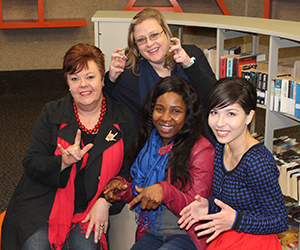Latest News Archive
Please select Category, Year, and then Month to display items
30 May 2025
|
Story Prof Mikateko Mathebula
|
Photo Supplied
 Pictured (from left to right): Prof Faith Mkwananzi, Dr Kapambwe Mwelwa, Prof Lochner Marais, Prof Chikumbutso Manthalu, and Prof Mikateko Mathebula.
Pictured (from left to right): Prof Faith Mkwananzi, Dr Kapambwe Mwelwa, Prof Lochner Marais, Prof Chikumbutso Manthalu, and Prof Mikateko Mathebula.
Through collaborative agreements with the University of Malawi and the University of Zambia, the University of the Free State (UFS) has established the Research Alliance for Higher Education in Africa (RAHEdA), a dynamic initiative aimed at enhancing research capacity and partnerships within Sub-Saharan Africa.
The collaborative agreements align with the UFS’s Vision 130 strategy in relation to internationalisation, emphasising the important role that intra-African mobility visits play in establishing relationships with universities on the continent. It also fosters knowledge exchange and engagement and allows for careful planning and strategy meetings.
“During these discussions, an ambitious but feasible roadmap was laid out for the next three to five years,” Prof Mkwananzi said. “These activities include online workshops for staff and postgraduate students at all partner institutions, and a new webinar series that focuses on profiling, advancing, and celebrating thought leaders, higher education scholars, and scholarship in Africa.”
The inaugural webinar was held on 21 May 2025. Speaker Prof Siseko Kumalo, Associate Professor at the University of Johannesburg’s Ali Mazrui Centre for Higher Education Studies, spoke on ‘Orality as the Bulwark of the Humanities?’, set the bar high for the webinar series through his compelling and original response to this timely question, as scholars around the world contemplate appropriate responses to the rise and influence of artificial intelligence in higher education teaching, learning, and assessment.
Funding to support RAHEdA has been generously provided by Prof Melanie Walker, Distinguished Professor and SARChI Chair in Higher Education and Human Development.
• For information on how to get involved and for updates on RAHEdA, please contact Prof Mikateko Mathebula at MathebulaM@ufs.ac.za
Largest group on African continent introduced to Sign Language
2016-07-05
 The introduction of basic Sign Language
The introduction of basic Sign Language
as part of the UFS101 course was a great
success. From left are Susan Lombaard,
Annemarie le Roux, Tshisikhawe Dzivhani
(all from the Department of South African
Sign Language), and Lauren Oosthuizen
(UFS101). Photo: Leonie Bolleurs
As a result of a new initiative at the University of the Free State (UFS), the largest group of students on the African continent took part in a first-year seminar which included Sign Language.
A total of 5400 students on the Bloemfontein Campus and 1000 on Qwaqwa Campus were taught basic Sign Language by Susan Lombaard, Acting Head of the Department of South African Sign Language, and her team members, Tshisikhawe Dzivhani, Annemarie le Roux, and Nicolene de Klerk.
It forms part of the UFS101 module presented to all first-year students. The initiative, begun in the first semester of 2016, will form part of UFS101 in future and was met with an overwhelmingly positive response.
Three segments of course
Sign Language was taught in three segments and positioned as large-class learning experiences in the Callie Human Centre (Bloemfontein Campus) and the Nelson Mandela Hall (Qwaqwa Campus). Students were taught about deaf culture, Sign Language theory, as well as how to sign their names, exchange pleasantries, and have a basic conversation.
A valuable skill to have
“It (the Sign Language experience) was very interesting and helpful,” said one of the students. “It is important to have the ability to communicate with all sorts of people, and to be able to help them in a crisis”. According to another, it sparked an interest in Sign Language. “It is a skill I will continue to use and try to learn more from it,” said a third.
Lombaard – in collaboration with the UFS101 team – will be presenting a paper related to this achievement at the DeafNet Africa Conference in Johannesburg, from 26 to 30 September 2016.